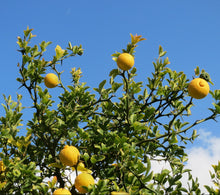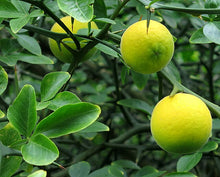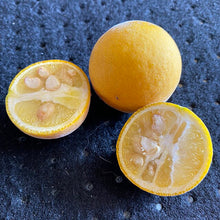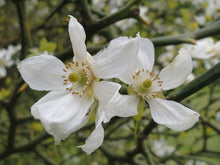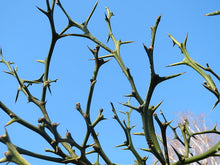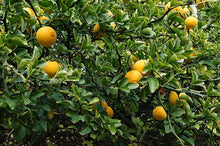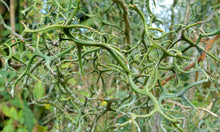Trifoliate Orange
Regular price
$5.00
Sale
Citrus trifoliata
Origin: East Asia (via Philadelphia)
Improvement status: Unknown
Seeds per packet: ~8
BOTANICAL SAMPLE - NOT GERMINATION TESTED
Life cycle: Perennial
Trifoliate orange is the most cold-hardy citrus fruit species. While native to China and Korea, it is well-adapted to much of the United States, thriving from USDA Zones 6 to 10 (with some individuals even able to handle chilly Zone 5 winters, surviving temperatures as low as -15 degrees Fahrenheit). The plants are well-known in many urban and suburban landscapes for their vicious-looking thorns, which can reach lengths of two inches or longer, and for their ping-pong-ball-sized slightly-fuzzy yellow fruits. The relatively inconspicuous three-lobed leaves resembles slenderer versions of other citrus leaves. The white flowers are fragrant and beautiful.
While most people think of trifoliate orange as little more than an ornamental curiosity (or perhaps an imposing, impenetrable hedge plant), it is both edible in its own right and has other important agronomic uses. The fruit are loaded with inedible seeds, but there's still some juice and pulp in there, and despite their extreme bitterness (more bitter than grapefruit), they can be transformed into a very fine marmalade. The skin can be used in the kitchen as well, to make a very strong-flavored zest in lieu of lemon zest. But perhaps the best use of trifoliate orange is as breeding stock for the creation of new cold-hardy citrus plants or as rootstock to extend the range of existing citrus species. Already there exist hybrid fruits created with trifoliate orange parentage, including the "citrange" (from a cross with sweet orange) and "citrumelo" (from a cross with 'Duncan' grapefruit), and with the increasing availability of other citrus fruit trees (like yuzu, kumquats, and pomelos), we have no doubt more interesting and useful trifoliate hybrids will be coming down the pike soon. As a rootstock for other citrus species, trifoliate oranges offer cold tolerance and resistance to pests including phytophthora root rot and citrus tristeza virus.
GROWING TIPS: Like all citrus species, trifoliate oranges have what are called "recalcitrant" seeds, which in this case means that they cannot be dried out or frozen. Our seeds (donated to EFN by our friends at the Philadelphia Orchard Project from outdoor plantings across the City of Philadelphia) have been kept in their own pulp, in the refrigerator, since their harvest. We strongly recommend you do the same until you're ready to plant them. At that point, simply plant the seeds in any potting mix, put them in a relatively warm place, and watch them grow!








